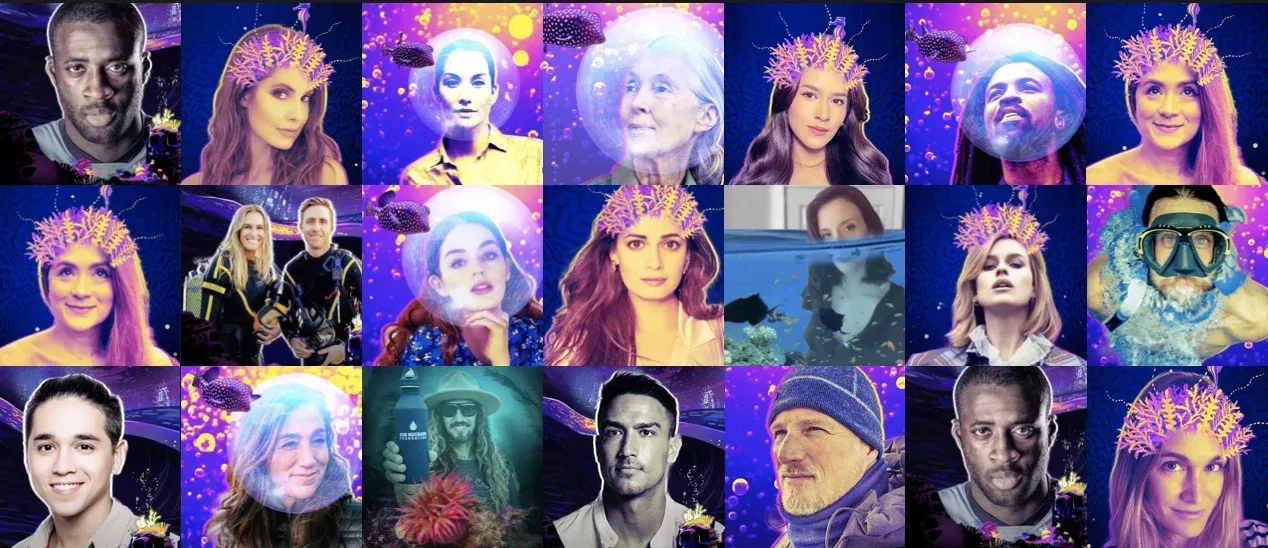The United Nations Environment Programme (UNEP) and The Ocean Agency, in collaboration with creativity partner Adobe, launched Ocean League, a new campaign that showcases the power of creativity in driving positive change for ocean protection and climate action.
The ocean is facing a perfect storm of pollution, overfishing, and climate change, and these threats have pushed ecosystems such as coral reefs to the tipping point of collapse. Coral reefs alone support 25% of all ocean life and over half a billion people with food and income. At this critical moment in time, the campaign invites individuals, leaders, organisations and brands to join the #OceanLeague and the Glowing Gone campaign, a global movement supporting greater ocean protection.
As a part of the collaboration, the Ocean League pledge for greater ocean protection is powered by Adobe Sign, making it easy to access and e-sign from any device. Additionally, Adobe has created specially designed ocean-themed Adobe Photoshop Camera lenses, giving everyone the opportunity to immerse themselves in underwater worlds and share creative imagery to show their support.
“The crisis facing the ocean is one of the biggest environmental issues of our time. We need to be far more creative in our approach to create a groundswell of popular support and action for the ocean. This is why we are excited to have teamed up with Adobe on this campaign,” said Leticia Carvalho, Head of Marine and Freshwater at UNEP.
On September 30th 2020, the UN Biodiversity Summit will take place, marking the start of a year packed with international conferences where conservation targets for the next decade will be determined – described as “the Super Year for the Ocean” by the UN Secretary-General’s Special Envoy for the Ocean, Peter Thomson. UNEP, The Ocean Agency and Adobe will showcase this groundswell of support to policy-makers through visual displays at key events, with the specific goal of prioritizing coral reefs and oceans in the Post-2020 framework at the Conference of the Parties to the Convention on Biological Diversity in 2021 (CoP15).
“In this moment, the power of creativity and the ability for it to have a global impact has never been more relevant,” said Adobe VP Brand Marketing, John Travis. “Adobe is committed to inspiring and enabling creativity for all, so that together we can create change. We are so proud to support UNEP and The Ocean Agency and empower the global community to take action towards ocean conservation.”
The campaign collaboration builds on the success of the #GlowingGone campaign, a partnership between UNEP, The Ocean Agency, Adobe and Pantone in 2019, which reached millions of people through creative challenges and sports events, such as the World Surf League. The campaign brings attention to the ocean’s warning sign that is currently going unnoticed: corals glowing in fluorescent colours to protect themselves from rising ocean temperatures. These fragile ecosystems are on the frontline of climate change and need the world’s attention.
“Ocean conservation is rarely prioritised as an issue, despite the fact that a healthy ocean is of fundamental importance to all life on Earth. We know that a positive show of mass support – including global brands and celebrities – can inspire the policy and funding commitments we need from governments,” said Richard Vevers, CEO of The Ocean Agency.
UN Goodwill Ambassadors and ocean advocates from around the world are supporting the campaign, encouraging digital audiences to share their creations with #GlowingGone and #OceanLeague to highlight their support. UN Messenger of Peace Jane Goodall, with UNEP Ambassadors, influencers and ocean advocates include: Raisa Andriana and Hamish Daud, David de Rothschild, Alice Eve, Amanda Cerny, Philippe and Ashlan Cousteau, Rocky Dawuni, Shawn Heinrichs, Nadya Hutagalung, Dana Melanie, Dia Mirza, Cristina Mittermeier and Paul Nicklen, Alex Rendell, Antoinette Taus, and Yaya Touré, as well as Julie Lake and Rob Machado.
“The current pandemic has put a spotlight on our unhealthy relationship with the environment, and especially our ocean. Ocean acidification, and many forms of pollution from marine litter to harmful nutrients, are decreasing its balance and productivity. Ecosystems such as coral reefs are rapidly facing complete collapse, with 50 percent of coral cover around the world damaged. Like the pandemic, it is having the greatest impact on some of the world’s poorest communities. It’s critical that the international community uses the opportunity of the coming conferences to set bold targets for ocean conservation,” said Ashlan Cousteau.
Source: UNEP press release
